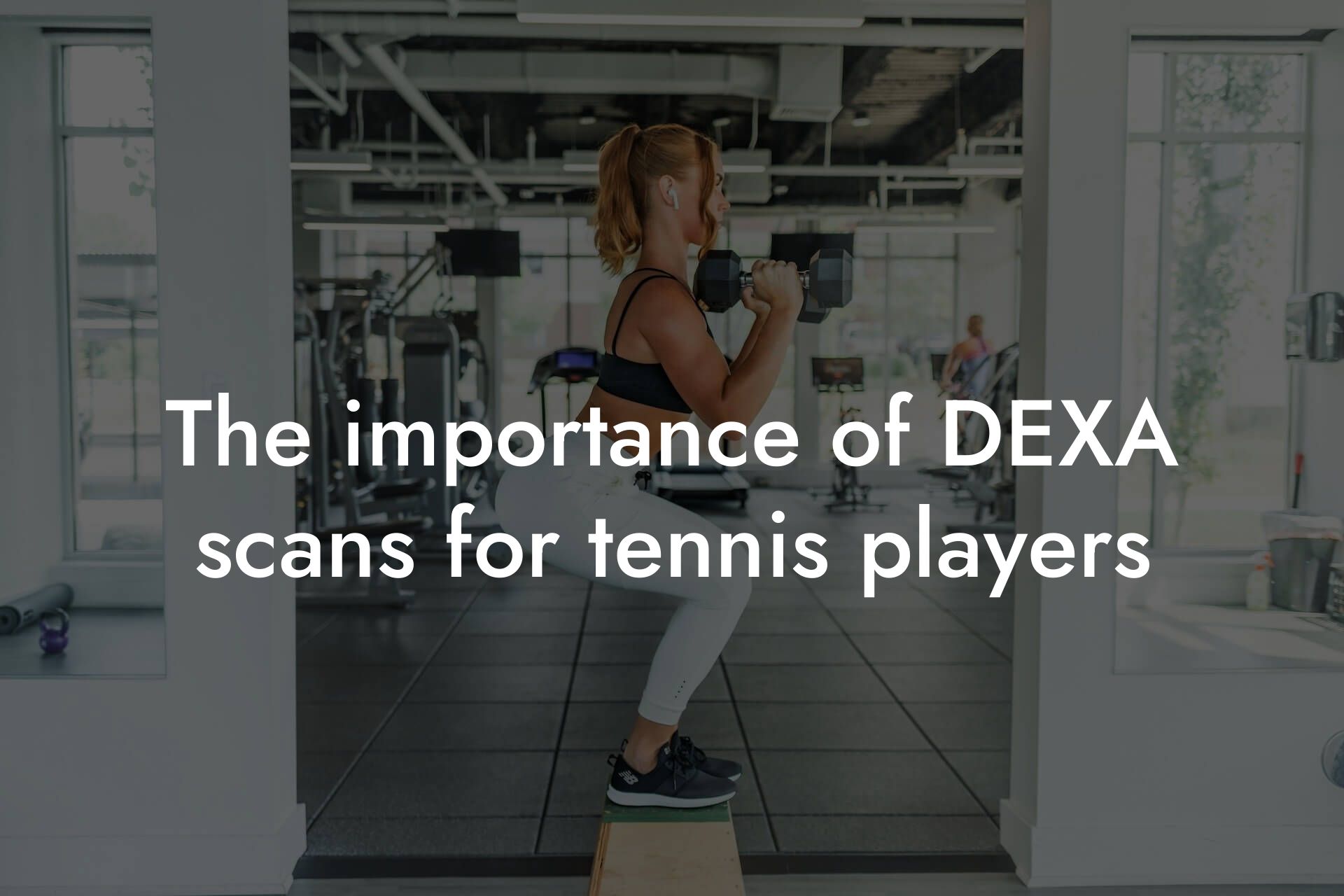Understanding Bone Density and Its Importance in Tennis
Bone density is a critical aspect of overall health, and it plays a vital role in preventing injuries in tennis players. As a high-earning professional, you understand the importance of maintaining a healthy physique to excel in your sport. Tennis, in particular, is a high-impact sport that requires quick movements, rapid changes of direction, and explosive power. These demands can put immense stress on your bones, joints, and muscles, making you more susceptible to injuries. Therefore, it's essential to understand the role of bone density in preventing tennis injuries and how you can maintain optimal bone health to perform at your best.
Table of Contents
- Understanding Bone Density and Its Importance in Tennis
- What is Bone Density, and How is it Measured?
- The Risks of Low Bone Density in Tennis Players
- How Bone Density Affects Tennis Performance
- Factors that Affect Bone Density in Tennis Players
- How to Improve Bone Density for Tennis Players
- DEXA Scanning for Tennis Players
- Frequently Asked Questions
What is Bone Density, and How is it Measured?
Bone density refers to the measure of the amount of minerals, such as calcium and phosphorus, present in your bones. The higher your bone density, the stronger and more resilient your bones are. Bone density is typically measured using a DEXA (Dual-Energy X-ray Absorptiometry) scan, which is a non-invasive and painless procedure. A DEXA scan can provide a detailed assessment of your bone density, body composition, and fat distribution, giving you a comprehensive understanding of your overall health.
The Risks of Low Bone Density in Tennis Players
Tennis players with low bone density are at a higher risk of developing injuries, particularly stress fractures, osteoporosis, and tendonitis. The repetitive stress and impact of tennis can cause micro-fractures in the bones, which can lead to more severe injuries if left untreated. Low bone density can also affect your performance, as it can lead to fatigue, decreased power, and reduced speed. Furthermore, low bone density can increase your risk of developing chronic conditions, such as osteoarthritis, which can have long-term consequences for your health and career.
How Bone Density Affects Tennis Performance
Bone density plays a critical role in tennis performance, as it affects your power, speed, and agility. Stronger bones can absorb the impact of landing and quick changes of direction, allowing you to generate more power and speed. Additionally, good bone density can help you maintain proper technique and reduce your risk of injury. On the other hand, low bone density can lead to fatigue, decreased performance, and a higher risk of injury, which can ultimately affect your career and earning potential.
Factors that Affect Bone Density in Tennis Players
Several factors can affect bone density in tennis players, including genetics, nutrition, training habits, and overall lifestyle. A diet rich in calcium and vitamin D, regular exercise, and adequate sleep are essential for maintaining optimal bone density. However, factors such as inadequate nutrition, excessive training, and poor recovery habits can negatively impact bone density. Additionally, certain medical conditions, such as osteoporosis, and medications, such as corticosteroids, can also affect bone density.
How to Improve Bone Density for Tennis Players
Improving bone density requires a combination of proper nutrition, regular exercise, and healthy lifestyle habits. A diet rich in calcium and vitamin D, along with regular consumption of omega-3 fatty acids, can help promote bone health. Resistance training exercises, such as weightlifting and plyometrics, can also help improve bone density by stimulating bone growth and strengthening muscles. Additionally, incorporating exercises that target the core and legs, such as squats and lunges, can help improve bone density in the hips and legs.
DEXA Scanning for Tennis Players
DEXA scanning is an essential tool for tennis players looking to optimize their bone density and prevent injuries. A DEXA scan can provide a detailed assessment of your bone density, body composition, and fat distribution, giving you a comprehensive understanding of your overall health. At Tano Performance Group, we use state-of-the-art DEXA technology to provide high-earning professionals like you with a complete body assessment. Our expert team will work with you to develop a personalized training and nutrition plan tailored to your specific needs and goals.
In conclusion, bone density plays a critical role in preventing tennis injuries and optimizing performance. As a high-earning professional, it's essential to prioritize your bone health by maintaining a healthy diet, regular exercise, and proper recovery habits. By incorporating DEXA scanning into your training regimen, you can gain a deeper understanding of your bone density and take proactive steps to prevent injuries and optimize your performance. At Tano Performance Group, we're committed to helping you achieve your goals and take your career to the next level.
Frequently Asked Questions
What is bone density, and why is it important for tennis players?
Bone density refers to the measure of how dense and strong your bones are. As a tennis player, having optimal bone density is crucial because it helps to reduce the risk of injuries, particularly stress fractures, which can occur due to repetitive strain and impact on the bones. Stronger bones can withstand the demands of tennis, allowing you to perform at your best while minimizing the risk of injury.
How does bone density affect tennis performance?
Bone density plays a significant role in tennis performance. When your bones are dense and strong, you'll experience improved power, speed, and agility on the court. This is because your bones can handle the forces and stresses generated by rapid movements, jumps, and changes of direction. Additionally, good bone density can help you maintain proper technique and reduce fatigue, allowing you to perform at a higher level for longer periods.
What are the common tennis injuries related to bone density?
Tennis players with low bone density are more susceptible to injuries such as stress fractures, shin splints, and osteoporosis. Stress fractures, in particular, are a common issue, especially in the lower extremities, including the feet, ankles, and legs. These injuries can be debilitating and require extended periods of rest and rehabilitation, which can be frustrating and demotivating for tennis players.
How can I measure my bone density?
There are several ways to measure bone density, including dual-energy X-ray absorptiometry (DXA), quantitative computed tomography (QCT), and peripheral dual-energy X-ray absorptiometry (pDXA). These tests are usually performed by a healthcare professional and provide a detailed assessment of your bone density. At Tano Performance Group, we recommend consulting with a qualified healthcare professional to determine the best course of action for your specific needs.
What is the ideal bone density for tennis players?
The ideal bone density for tennis players varies depending on factors such as age, sex, and body composition. Generally, a bone density T-score of -1 or higher is considered optimal for athletes. However, it's essential to consult with a healthcare professional to determine your individual bone density goals and develop a personalized plan to achieve them.
How can I improve my bone density for tennis?
Improving bone density requires a combination of proper nutrition, regular exercise, and lifestyle modifications. Ensure you're consuming a diet rich in calcium and vitamin D, and engage in weight-bearing exercises such as strength training, plyometrics, and high-impact aerobics. Additionally, incorporate exercises that target your core, legs, and glutes, as these are essential for generating power and speed on the court.
What role does nutrition play in bone density for tennis players?
Nutrition plays a critical role in maintaining optimal bone density. A diet rich in calcium, vitamin D, and other essential nutrients such as protein, magnesium, and phosphorus is essential for building and maintaining strong bones. Additionally, staying hydrated by drinking plenty of water is crucial for overall health and bone density.
Can I improve my bone density at any age?
While it's true that bone density peaks in early adulthood, it's never too late to take steps to improve your bone health. With a combination of proper nutrition, regular exercise, and lifestyle modifications, you can improve your bone density at any age. However, the earlier you start, the better, as it's easier to build strong bones when you're younger.
How does body composition affect bone density in tennis players?
Body composition plays a significant role in bone density. Excess body fat, particularly visceral fat, can negatively impact bone density, while lean muscle mass can help improve it. As a tennis player, maintaining a healthy body composition through a combination of proper nutrition and regular exercise is essential for optimal bone density and overall performance.
What is the relationship between bone density and body fat percentage?
Research has shown that there is an inverse relationship between bone density and body fat percentage. In other words, as body fat percentage increases, bone density tends to decrease. This is because excess body fat can lead to inflammation, which can negatively impact bone health. Maintaining a healthy body fat percentage through a combination of proper nutrition and regular exercise is essential for optimal bone density.
How can I reduce my risk of stress fractures as a tennis player?
To reduce your risk of stress fractures, it's essential to maintain optimal bone density, wear proper footwear, and gradually increase your training intensity and volume. Additionally, incorporate exercises that target your core, legs, and glutes, and make sure to warm up and cool down properly before and after play.
What are some exercises that can help improve bone density for tennis?
Exercises that can help improve bone density for tennis include squats, lunges, deadlifts, leg press, and calf raises. Additionally, incorporating plyometric exercises such as jump squats and box jumps can help improve power and speed on the court. It's essential to work with a qualified coach or trainer to develop a personalized exercise program that meets your specific needs and goals.
How often should I exercise to improve my bone density for tennis?
Aim to exercise at least 3-4 times per week, with a focus on weight-bearing exercises and plyometrics. It's essential to allow for rest and recovery time to allow your bones to adapt and grow stronger. Additionally, incorporate exercises that target your core, legs, and glutes, as these are essential for generating power and speed on the court.
Can I improve my bone density without exercise?
While exercise is an essential component of improving bone density, it's not the only factor. Proper nutrition, including a diet rich in calcium and vitamin D, and lifestyle modifications such as getting enough sleep and reducing stress, can also help improve bone density. However, exercise is a critical component of building strong bones, and it's essential to incorporate it into your routine.
How long does it take to see improvements in bone density?
The rate at which you see improvements in bone density depends on a variety of factors, including your current bone density, diet, exercise routine, and overall health. Generally, you can expect to see improvements in bone density within 6-12 months of starting a comprehensive exercise and nutrition program. However, it's essential to be patient and consistent, as building strong bones takes time.
Can I use supplements to improve my bone density for tennis?
While supplements can be helpful in supporting bone health, it's essential to consult with a healthcare professional before adding any new supplements to your routine. Calcium and vitamin D supplements are commonly used to support bone health, but it's crucial to ensure you're getting enough from your diet and exercise routine first.
How does stress affect bone density in tennis players?
Chronic stress can negatively impact bone density by increasing the production of cortisol, a hormone that can break down bone tissue. As a tennis player, it's essential to manage stress through techniques such as meditation, deep breathing, and yoga, in addition to maintaining a healthy diet and exercise routine.
Can I improve my bone density if I have a history of injuries?
Yes, it's possible to improve your bone density even if you have a history of injuries. However, it's essential to work with a qualified healthcare professional to develop a personalized plan that takes into account your specific needs and goals. This may involve modifying your exercise routine, incorporating exercises that target your core and legs, and making lifestyle changes to support bone health.
How can I prevent osteoporosis as a tennis player?
To prevent osteoporosis, it's essential to maintain optimal bone density through a combination of proper nutrition, regular exercise, and lifestyle modifications. Additionally, incorporating exercises that target your core, legs, and glutes, and making sure to wear proper footwear and warm up and cool down properly before and after play can help reduce your risk of osteoporosis.
What role does sleep play in bone density for tennis players?
Sleep plays a critical role in bone density, as it's during sleep that your body repairs and rebuilds bone tissue. Aim for 7-9 hours of sleep per night and prioritize good sleep hygiene practices such as maintaining a consistent sleep schedule, avoiding caffeine and electronics before bedtime, and creating a relaxing sleep environment.
How can I track my progress and monitor my bone density?
Work with a qualified healthcare professional to track your progress and monitor your bone density through regular testing and assessments. Additionally, pay attention to changes in your body composition, energy levels, and overall performance on the court. By tracking your progress and making adjustments as needed, you can optimize your bone density and achieve your tennis goals.
Here are some related articles you might love...
- Strength training programs for tennis athletes
- The importance of DEXA scans for tennis players
- Off-season conditioning for tennis players
- How to maintain endurance during long tennis matches
- Improving core strength for better tennis strokes
- How body composition impacts tennis agility and speed
- Nutrition strategies for sustained energy during tennis matches
- Reducing body fat to enhance tennis performance
- Recovery techniques for tennis professionals
Zak Faulkner
Zak Faulkner is a leading authority in the realm of physical health and body composition analysis, with over 15 years of experience helping professionals optimise their fitness and well-being. As one the experts behind Tano Performance Group, Zak has dedicated his career to providing in-depth, science-backed insights that empower clients to elevate their physical performance and overall health.
With extensive knowledge of DEXA technology, Zak specializes in delivering comprehensive body assessments that offer precise data on body fat, muscle mass, bone density, and overall physique. His expertise enables individuals to make informed decisions and achieve their fitness goals with accuracy and confidence. Zak’s approach is rooted in a deep understanding of human physiology, combined with a passion for helping clients unlock their full potential through personalised strategies.
Over the years, Zak has earned a reputation for his commitment to excellence, precision, and client-focused service. His guidance is trusted by top professionals who demand the best when it comes to their health. Whether advising on fitness programs, nutritional strategies, or long-term wellness plans, Zak Faulkner’s insights are a valuable resource for anyone serious about taking their health and fitness to the next level.
At Tano Performance Group, Zak continues to lead our Content Team revolutionising how professionals approach their physical health, offering unparalleled expertise that drives real results.




